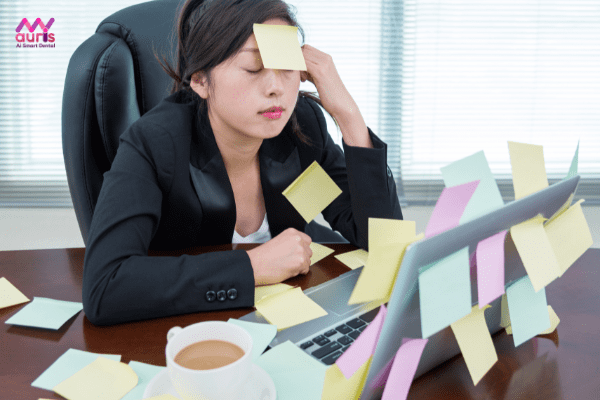Each individual has their own pressures and tensions in life. If adults are pressured about work or finances, children are pressured about learning and achievement. Especially in modern society or in urban areas and developed cities, there is more and more pressure on life. Therefore, it is easy to see or hear the phrase “stress” on appointments. So what is stress? What is the cause of stress and pressure?
What is stress?
Stress is considered a nervous state of tension, including physiological, psychological and behavioral reactions of an individual. This condition occurs when individuals are trying to adapt to change, or to internal or external pressures. These pressures are often stressors. They impact individuals in different situations.
When the body encounters stressors, it secretes hormones to help provide energy to the muscles, breathing and heart rate increase.

Normally, people often create pressure to get motivated in life, work or study. Because at this time, stress brings benefits to help you focus more on action. On the other hand, if too much pressure is created, leading to excessive levels of stress on a continuous basis, it will lead to health consequences. The body is always in a state of stress, anxiety, and fatigue, leading to loss of appetite, poor digestion, and weakened immunity. Even the worst situation can cause depression.
What are the manifestations of stress?
People who are easily stressed
Each person has their own pressures in their own lives. However, knowing how to reconcile and change can reduce the burden, fatigue, and worries. Recognizing your health situation and surrounding environment is the solution to help you stay away from pressure and stress.
Here are some cases and subjects susceptible to pressure:
- People with weak body, health, and psychology: lack of nutrients, often worried, have a weakened immune system,…
- People who live in unhealthy environments, full of negative things
- Overloaded with work, not strong enough tosolving tasks
- People who lack confidence, are shy, timid, have few social relationships
- Influenced by stress from people around.
Signs of stress
Symptoms of people under stress and pressure vary in severity or severity. Furthermore, it is expressed in many different forms such as physical, mental, behavioral, emotional.
- Physical manifestations: The body always feels tired, has headaches, difficulty sleeping, sleep disorders, chest pain, difficulty breathing, nausea and vomiting,…
- Mental manifestations: emotionally disturbed mood, unhappy, uncomfortable, difficulty concentrating at work,…
- Behavioral manifestations: crying, abnormal eating, self-harm, negative actions: harming others, falling into addiction, smoking,…
- Emotional expressions: stress, anxiety, fear, frustration, quick-tempered, angry, easily angered, often annoyed,…

Causes of stress
Stress and pressure do not naturally occur without external and internal influences. Therefore, the cause of stress has two external and internal factors:
Internal factors
- Health: people who often have poor health, are often sick, tired, especially with serious diseases,…
- Psychology: Frequently have negative psychology, often worry about even the smallest things, have too many expectations, put pressure on yourself, often lose sleep and often use stimulants,…
External factors
- Living environment with a lot of noise and pollution
- Sudden weather changes, too cold or too hot
- Family: not get along with parents, family members, close friends, siblings,…
- Social: pressure in work, study, achievement, surrounding relationships are not smooth, financial troubles, etc.
What should people who are stressed do?
In life things will not happen as we want. To reduce stress and pressure, the only way is for each person to harmonize and live with “stress”. If you can do it, it will help you feel more comfortable and face difficulties in life without negative thoughts or actions.
- Regular exercise: helps the body have more energy, health, and strengthens resistance. In particular, the body secretes happy hormones to relieve stress, fatigue,…
- Think optimistically: when there are pressures, try to revive yourself by thinking and acting optimistically and positively.
- Relaxation: practicing relaxation in a busy life is the way to help you erase worries and fatigue. Relaxation can be done through meditation, yoga, spa,…
- Diet: nutrition plays an important role when dealing with stress. When dealing with stress, the body needs vitamins and minerals necessary for nervous and endocrine activity. Essential vitamins and minerals are B vitamins, Vitamin C, minerals Magnesium and Calcium… Combined with supplementing lots of water, maybe juice from vegetables and fruits to ensure energy and nutrients for the body.
- Change living habits: sleep earlier, quit stimulants,…
- Establish healthy relationships: find people in the same situation, sympathetic or people who are always positive and cheerful. This makes it easier for you to share, and overcome difficulties with helpful words of encouragement
- Arrange work and study according to your strength, mixed with reasonable rest time.

Some information about stress and related factors helps people have a clearer view in life. When the body is under pressure and tension, each person should regulate accordinglypositive thoughts and change them. From there, it will help us feel more optimistic, happy and comfortable, and also learn how to cope with difficulties.
Anh Thy





